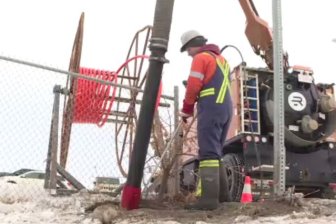The Alberta government is joining other provinces in helping Canadians access high-speed internet from Starlink — a low-orbit satellite internet service by Elon Musk’s company SpaceX.

The province announced Thursday it will be providing hardware rebates for Albertans who live in two remote areas on the southern border.
Residents and businesses of County of Forty Mile, County of Warner No. 5 and Cardston County — all located south of Medicine Hat and Lethbridge along the Canada-U-S border — can apply to be part of the pilot, which will test the use of satellite internet technology instead of fibre and fixed wireless technologies.

The pilot is limited to homes and businesses in two specific areas in the counties where land-based internet infrastructure is not yet possible or covered by approved broadband funding programs, such as the Universal Broadband Fund and Alberta Broadband Fund.
“This advancement ensures that even in our rural landscape, where connectivity has been a challenge, our agricultural community can harness the benefits of technology for greater efficiency and innovation,” County of Forty Mile No. 8 Reeve Stacey Barrows said in a statement.
“This is not just about connectivity, it’s about cultivating a technology-enabled agricultural landscape for generations to come.”
Only underserved households and businesses within the designated areas who meet the criteria are eligible for the pilot.

SpaceX has more than 3,200 Starlink satellites in orbit, providing high-speed, broadband internet to remote corners of the world.
All the Starlink hardware — self-aligning dish, mounts and cables — are shipped directly from the American company to customers. As long as it has a clear view of the sky, most remote properties can access the high speed internet.
The service itself costs $140 a month and comes with unlimited data, no contract and download speeds of 50 to 100 Mbps.
The province said in the future, other providers such as Telesat’s Lightspeed and Amazon’s Kuiper may offer services in Alberta and may qualify for a future rebate program.
A spokesperson for the Ministry of Technology and Innovation said intent is to expand the program eventually, but the purpose of this initial pilot is to gather information on uptake, usability, and capacity before extending it to other areas of the province.
The pilot will provide feedback that will help shape future programs.
“Advancing satellite internet technology in Alberta is an important milestone and an innovative way to achieve our goal of universal connectivity by 2027,” Technology and Innovation Minister Nate Glubish said.
The Alberta Broadband Strategy aims to provide access to connectivity across the province by 2027. The goal is for all Albertans to have reliable high-speed internet of 50 megabits per second download/10 megabits per second upload or better.
Under the pilot, those eligible need to buy new high-speed satellite internet service from Starlink between Thursday and until Feb. 16, 2024.
Then, between Dec. 15 and March 31, 2024, they can apply for a rebate of up to $1,000 that covers the cost of the Starlink hardware, shipping and taxes.
The province was unable to say why residents in those areas who already own a Starlink system can’t apply for a retroactive rebate, but said it may be considered in the future.
For several months earlier this year, SpaceX was offering a steep discount of $199 on the Starlink hardware for rural Canadians — down from the regular price of over $750.
Starlink is currently promoting a deal of $499 for hardware. Shipping is an additional $50.00. The internet access itself is $140/month.
Installation and monthly service charges are not eligible for the Alberta government rebate.
Starlink has been a gamechanger for rural Canadians from coast to coast, as well as in the far north, in areas where there are no other options for high-speed internet.

During the August wildfires that forced thousands of people from the Northwest Territories to flee south to Alberta and B.C. and destroyed a telecommunications fibre optic, people used Starlink satellite dishes to stay connected and get vital fire updates.
Local journalists also used the service to deliver those updates — in the case of Cabin Radio editor Ollie Williams, while fleeing down the highway, Starlink dish in the back of the truck wedged between bags of dog food.
Starlink has caught the attention of some provincial governments: last year, Quebec says it would invest $50 million into getting Starlink to about 10,000 remote homes in the province. The homes are located far from the province’s fiber-optic cable network.
Nova Scotia also offered about 3,700 rural homes and businesses a one-time rebate of up to $1,000 to acquire satellite internet and said Starlink was the only company that can meet the required minimum download and upload speed targets set by the Canadian Radio-television and Telecommunications Commission.
The Alberta government said it hopes within three years of achieving universal coverage and adoption of high-speed internet, it’ll boost tech jobs in rural areas, as well as increase access to telehealth and remote education for thousands of people.
The program is being launched now because the federal government is holding up the approval of further fibre and broadband projects across Canada, the province said Thursday, citing the Auditor General of Canada, who stated that they have “found delays in the rollout of a number of federal connectivity initiatives along with a small percentage of funding spent under these initiatives, resulting in some Canadians waiting even longer for access to high-speed Internet and mobile cellular connectivity.”
The Alberta government said its agreement with the federal government requires their participation in any announcements of further projects.
— with files from The Canadian Press















Comments